Top LGBTQ+ Peer Support Networks for Job Seekers
scale.jobs
September 12, 2025
LGBTQ+ job seekers often face challenges like workplace bias, identity-related stress, and limited access to supportive resources. Peer support networks address these issues by connecting individuals with communities that understand their experiences and provide career guidance. Here's a quick look at some of the best networks offering resources such as mentorship, job boards, and identity-specific support:
- Washington Peer Network: Focuses on local job listings, workplace advocacy, and mental health support.
- TalentAlly's LGBTQ+ Career Network: Nationwide connections, mentorship, and inclusive employer vetting.
- Pink Jobs: A job board exclusively listing roles from LGBTQ+-friendly employers.
- TransWork: Tailored for transgender and non-binary professionals, offering skill-building workshops and employer partnerships.
- Black Remote She: Supports Black queer and trans women and nonbinary individuals seeking remote work.
These networks provide a mix of emotional and professional support, helping job seekers navigate the job market while staying connected to inclusive opportunities.
E8: Workplace inclusivity for LGBTQ+ graduates with myGwork
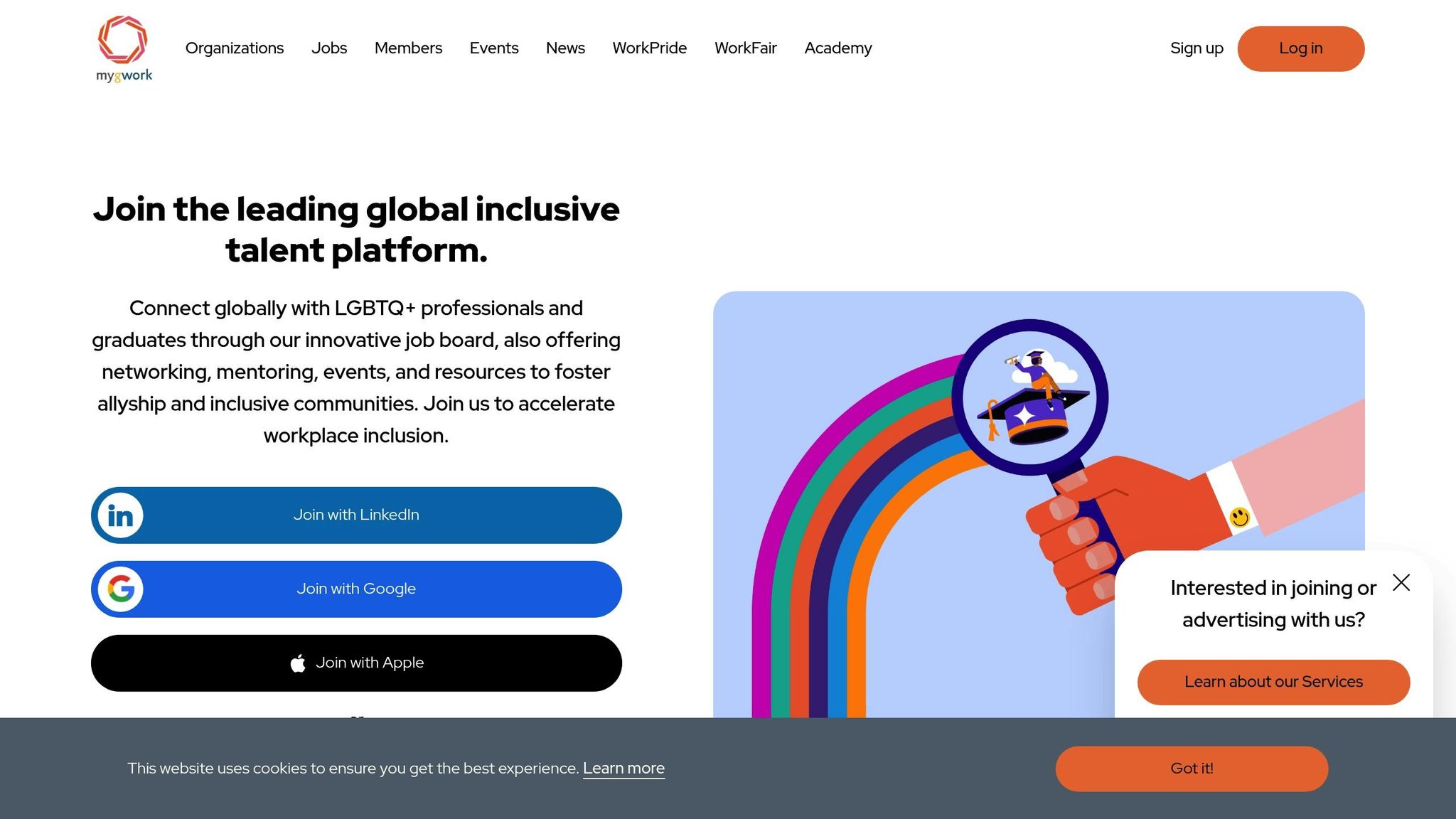
How to Choose the Right LGBTQ+ Peer Support Network
Finding the right LGBTQ+ peer support network is about more than just joining a group. It’s about selecting a space that aligns with your personal identity and career aspirations. Here’s how to evaluate your options effectively.
Diversity and Representation
Not all LGBTQ+ networks are created equal when it comes to inclusivity. Take a close look at the leadership and member base to ensure it reflects the full spectrum of the community. This includes representation for transgender individuals, people of color, different socioeconomic backgrounds, and a range of age groups.
Some networks cater primarily to gay and lesbian professionals, while others are inclusive of bisexual, transgender, non-binary, and queer identities. Networks that highlight diverse success stories often provide broader and more nuanced support.
Also, consider whether the network addresses intersectional challenges. For instance, the experiences of a Black lesbian professional may differ greatly from those of a white gay man. The best networks recognize these unique challenges and offer tailored resources to address them.
Access and Availability
A network’s accessibility plays a big role in its usefulness. Some organizations are centered in major cities like New York, San Francisco, or Chicago, while others offer nationwide support through online platforms. These might include virtual networking events, forums, or 24/7 chat groups.
Cost is another factor to weigh. Membership fees can range from free to $200 per year, with premium networks often offering perks like one-on-one mentoring or exclusive job postings.
Accessibility also means being inclusive of various needs. Look for networks that offer language support, as well as accommodations for individuals with disabilities, to ensure everyone feels welcome and supported.
Career Resources and Support Services
The best networks don’t stop at emotional support - they also provide tools to help you thrive professionally. Look for features like job boards listing LGBTQ+-friendly employers, resume reviews, and interview coaching tailored to identity-related concerns.
Mentorship programs are another key offering. Being paired with a senior professional who understands the unique challenges of being LGBTQ+ in the workplace can provide invaluable guidance, not just for job searches but for long-term career development.
Some networks also specialize in industry-specific support. For example, a tech professional might benefit from a network familiar with Silicon Valley’s culture, while someone in healthcare might need advice on navigating more conservative workplaces.
In addition, many networks provide legal resources and host workshops on topics like salary negotiation and workplace advocacy. These services can be especially helpful in addressing the evolving challenges faced by LGBTQ+ employees today.
Best LGBTQ+ Peer Support Networks for Job Seekers
Here are five networks that have consistently helped LGBTQ+ professionals find fulfilling careers while building supportive communities. Each one brings its own strengths to the table, making them a valuable addition to modern job search strategies.
Washington Peer Network
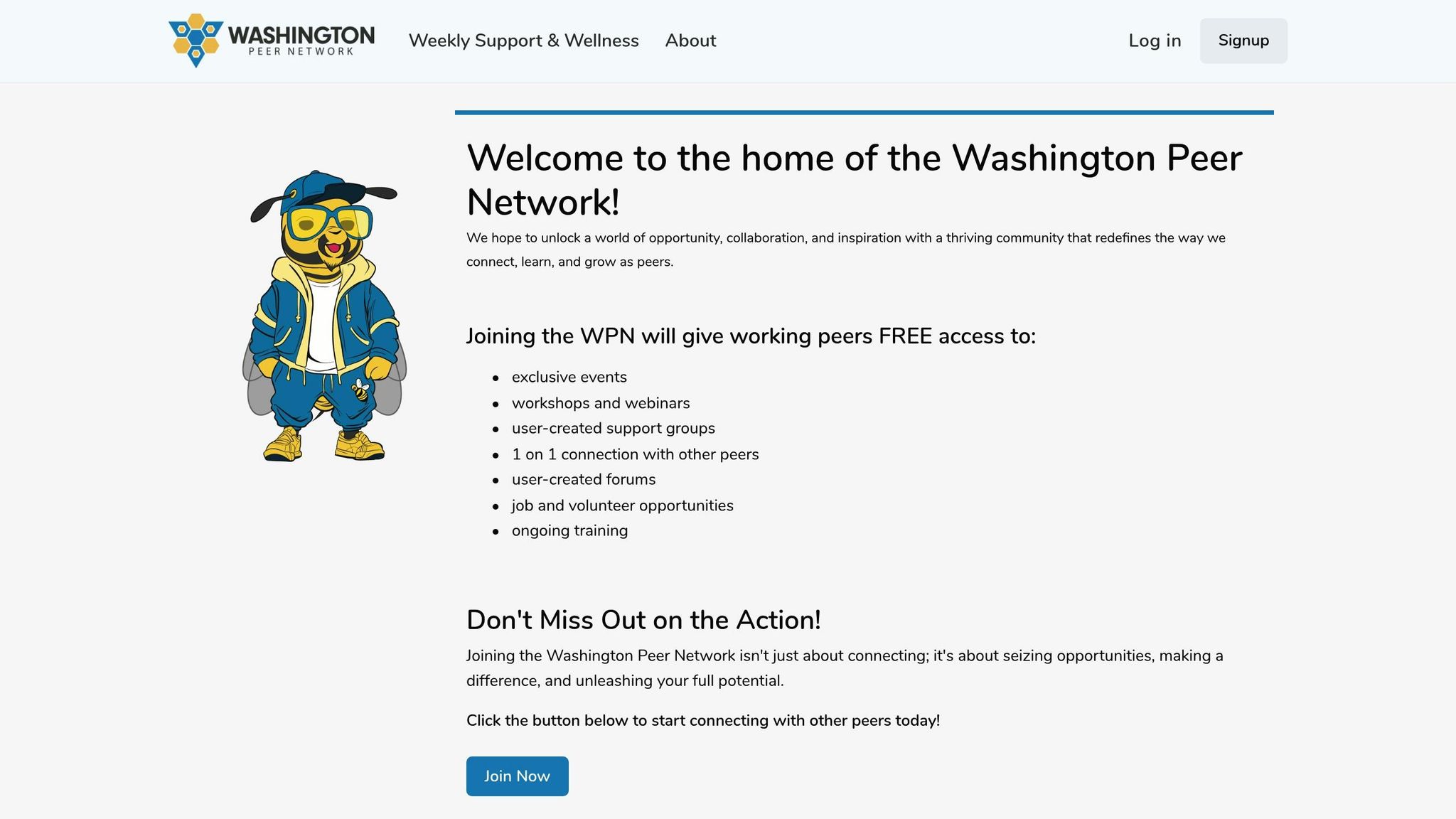
The Washington Peer Network is a peer-led initiative designed for LGBTQ+ job seekers in Washington. It provides job listings, workplace advocacy, and mental health support. A standout feature is its peer navigation service, which connects members with others who have faced similar career hurdles. This creates opportunities to gain firsthand insights into company cultures and interview processes.
The network emphasizes the importance of authentic inclusion. As they put it:
"Pride at work means more than policies or rainbow logos - it's about creating real spaces of belonging."
By collaborating with organizations like Trans Lifeline, The Trevor Project, and QLaw Foundation, the network ensures its members also have access to crisis intervention and legal resources, addressing challenges that often intersect with the job search journey.
Next, TalentAlly offers a nationwide reach for LGBTQ+ professionals.
TalentAlly's LGBTQ+ Career Network
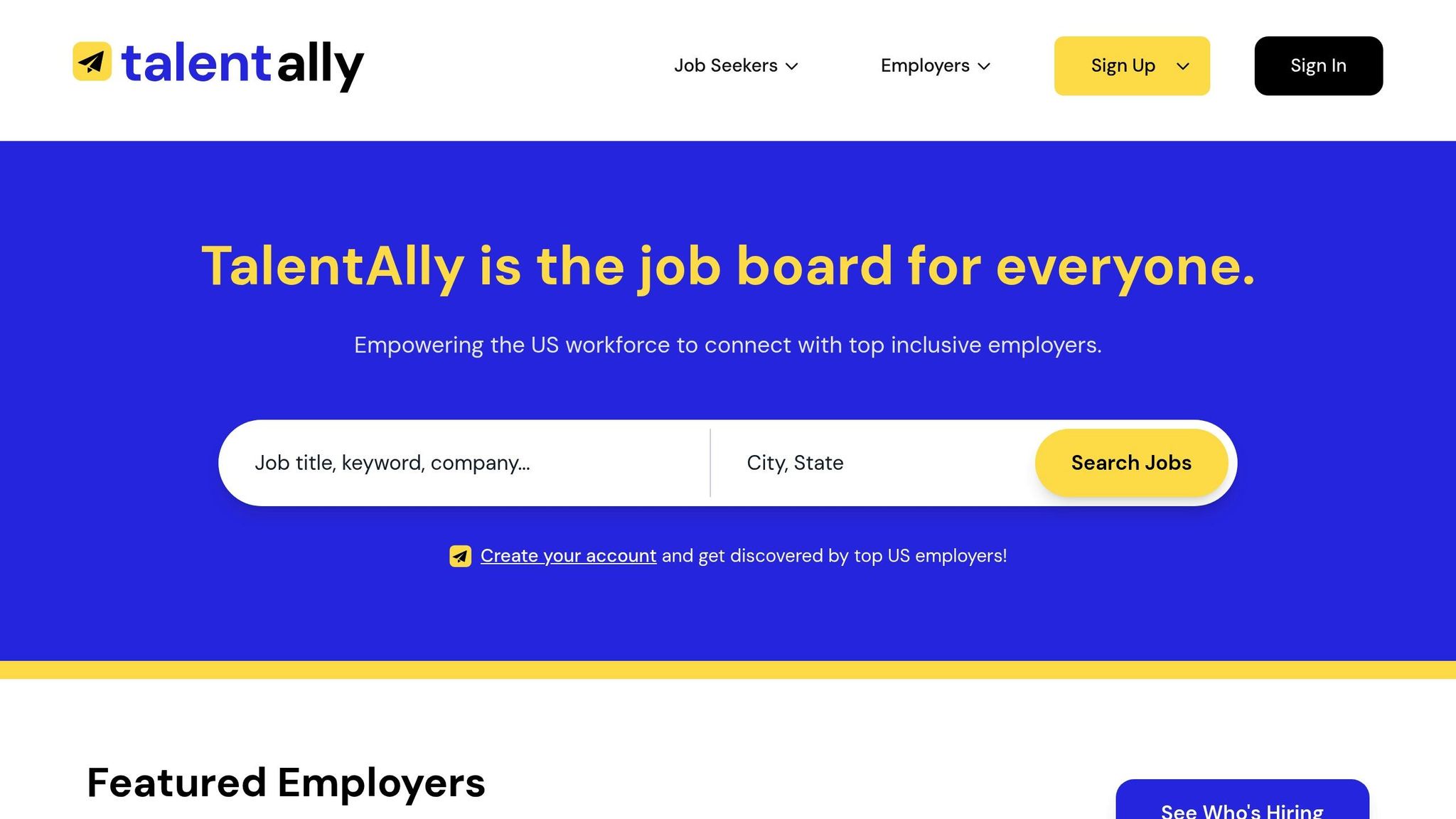
TalentAlly's LGBTQ+ Career Network connects professionals nationwide with employers who are thoroughly vetted for inclusivity. They host both virtual and in-person career events and offer a mentorship program that pairs candidates with senior professionals who share similar identity experiences. This mentorship provides personalized guidance that blends industry expertise with an understanding of individual backgrounds.
While TalentAlly focuses on broad national connections, Pink Jobs narrows its scope to curating highly targeted job opportunities.
Pink Jobs
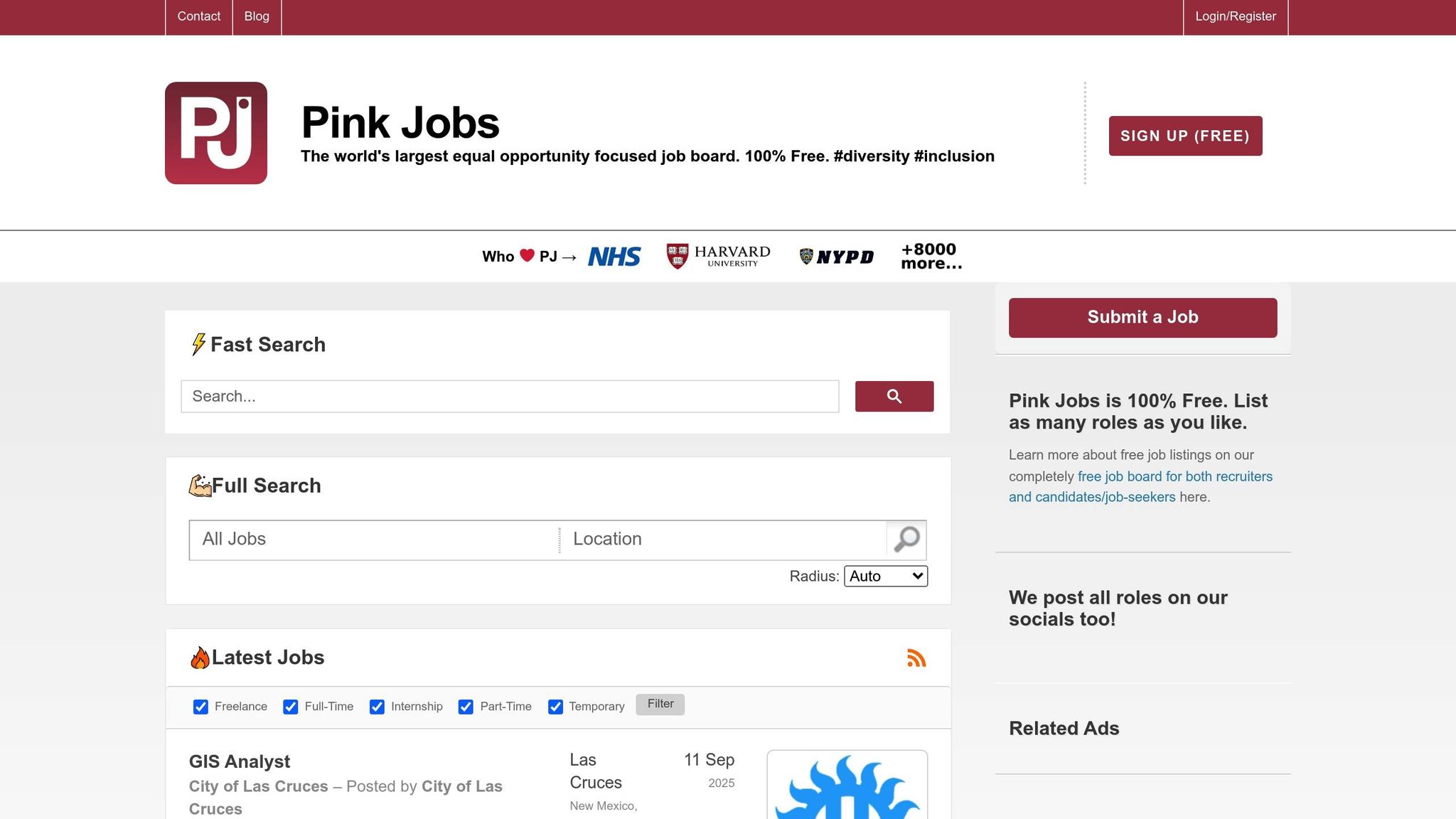
Pink Jobs is a specialized job board featuring positions exclusively from employers with established LGBTQ+ inclusive policies. The platform allows candidates to filter jobs by location, industry, or specific benefits such as transgender healthcare coverage or domestic partner benefits. It also includes detailed company profiles that highlight employee resource groups and diversity metrics, helping job seekers make informed decisions about where to apply.
For transgender professionals, TransWork provides tailored support and resources.
TransWork
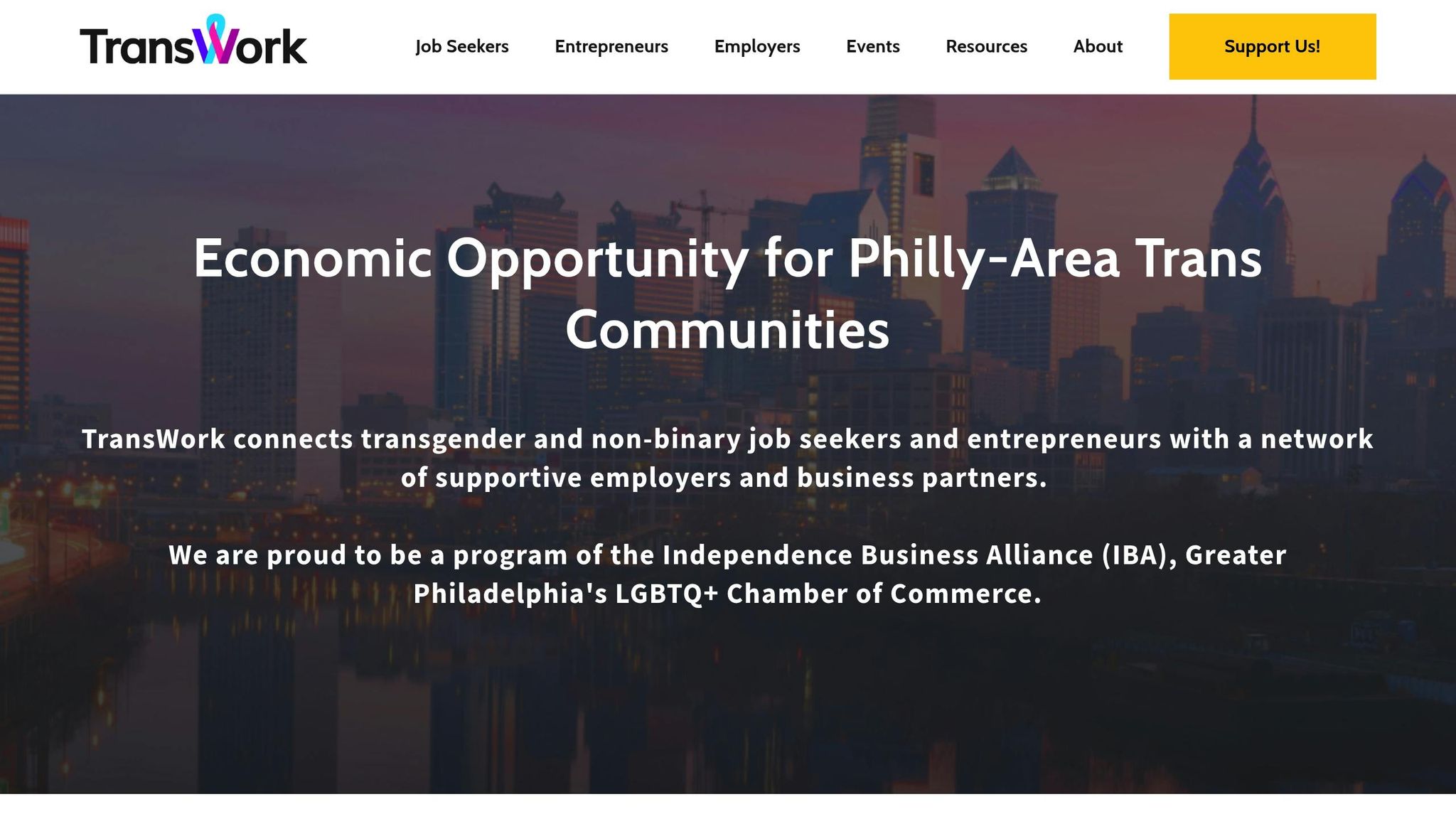
Based in Philadelphia, TransWork is dedicated to supporting transgender and non-binary professionals. It partners with local employers who prioritize inclusive hiring practices and workplace policies. TransWork also offers skill-building workshops that address practical concerns like updating names or gender markers on professional documents and handling employment gaps linked to transitions. Their employer partnership program provides ongoing training for HR teams and hiring managers, fostering respectful and supportive work environments. This approach has led to stronger retention rates for transgender employees placed through the network.
Finally, Black Remote She focuses on the unique challenges faced by Black LGBTQ+ individuals in the remote work landscape.
Black Remote She
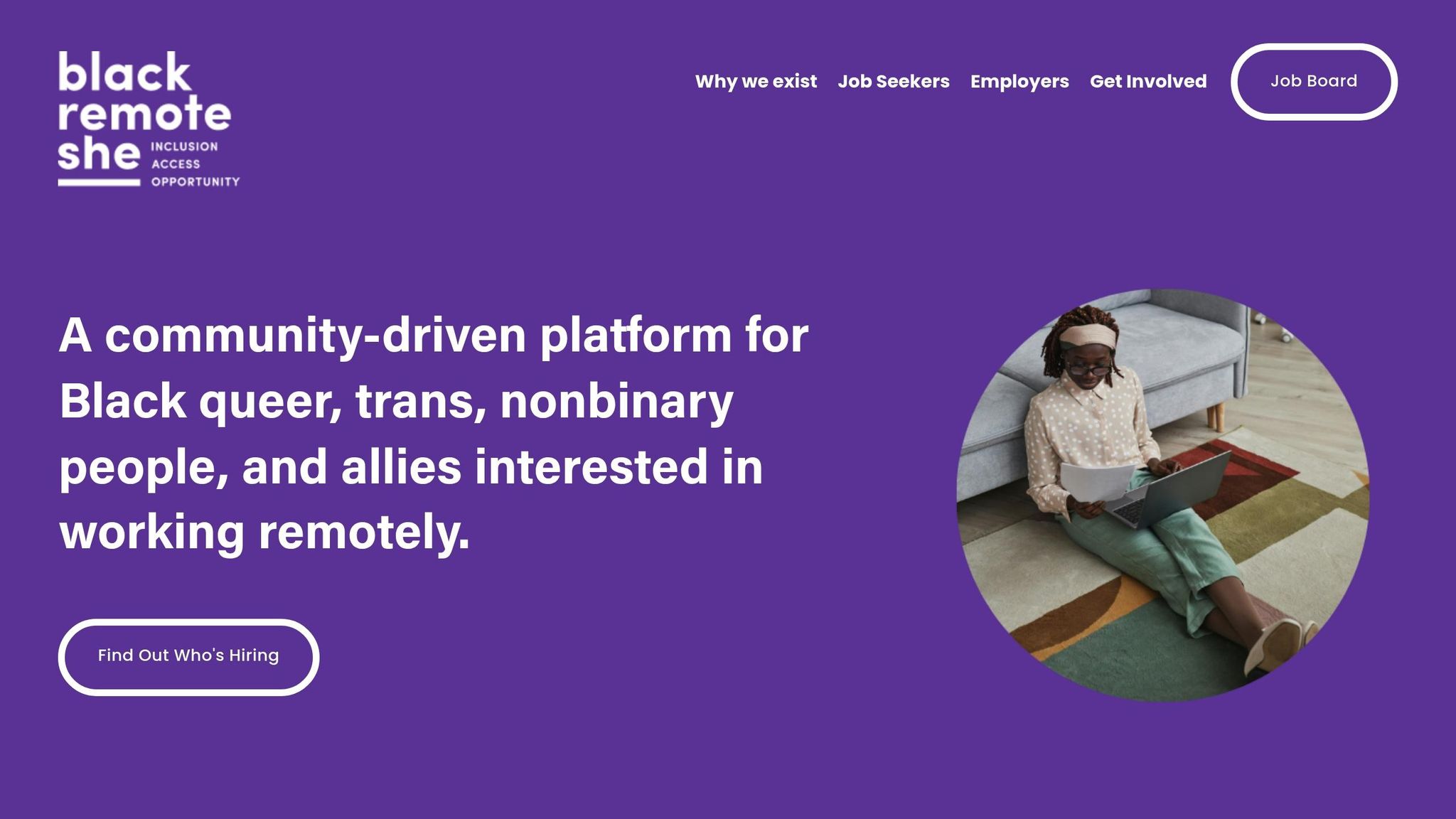
Black Remote She is tailored for Black queer and trans women, nonbinary individuals, and allies seeking remote work opportunities. Understanding that remote roles can provide safer and more affirming environments, the platform offers a resource hub with tools for gender-affirming career development, funding opportunities, and connections to inclusive, remote-friendly employers. Members also gain access to career alignment tools that match their skills with remote opportunities that meet their personal and professional needs. By helping members build networks outside of traditional office spaces, Black Remote She addresses the compounded challenges faced by Black LGBTQ+ professionals in the workforce.
Comparison: Features of Leading LGBTQ+ Peer Support Networks
When exploring LGBTQ+ peer support networks, it’s important to consider how their features align with your career aspirations. These networks are designed to support LGBTQ+ job seekers by offering a variety of services, addressing workplace biases, and promoting inclusivity. Each platform has its own approach, so understanding their key differences can help you make an informed choice.
Geographic Reach
Some networks are deeply rooted in local communities, hosting events and offering resources tailored to specific areas. Others provide broader access, including nationwide or remote opportunities. Whether you prefer in-person connections or the flexibility of virtual engagement, there’s an option that fits your preference.
Cost Structures
The cost of accessing these networks varies widely. Many operate on a free, peer-led basis, ensuring essential services like job matching and networking are accessible to everyone. Some platforms adopt a freemium model, combining free basic services with paid options like coaching or premium resources.
Target Demographics
Different networks cater to specific segments of the LGBTQ+ community. While some focus on transgender professionals or other niche groups, others are open to the broader LGBTQ+ population. The group a network targets often influences the types of services and resources they provide.
Service Depth
The range of services offered also sets these networks apart. Some platforms function primarily as job boards with inclusive profiles, while others go further by offering mentorship programs, peer navigation, and mental health support. Many also work with employers to develop training programs that foster inclusive workplace environments.
Employer Vetting and Technology Integration
Employer screening processes are another key differentiator. Some networks require employers to demonstrate inclusive policies before listing job opportunities, while others rely on ongoing community feedback to assess workplace practices. On the tech side, some platforms use advanced algorithms and filtering tools to match job seekers with opportunities, while others emphasize personal, community-driven connections over automation.
Combining Peer Support with Modern Job Application Tools
Blending LGBTQ+ peer support with advanced job application tools tackles both the emotional and practical challenges of navigating today’s job market. According to the Human Rights Campaign (2021), 46% of LGBTQ+ workers in the U.S. have faced unfair treatment at work, highlighting the need for strong community connections and effective job search strategies. Let’s explore how scale.jobs’ free tools can enhance a network-driven job search experience.
Using scale.jobs' Free Job Search Tools with Peer Support
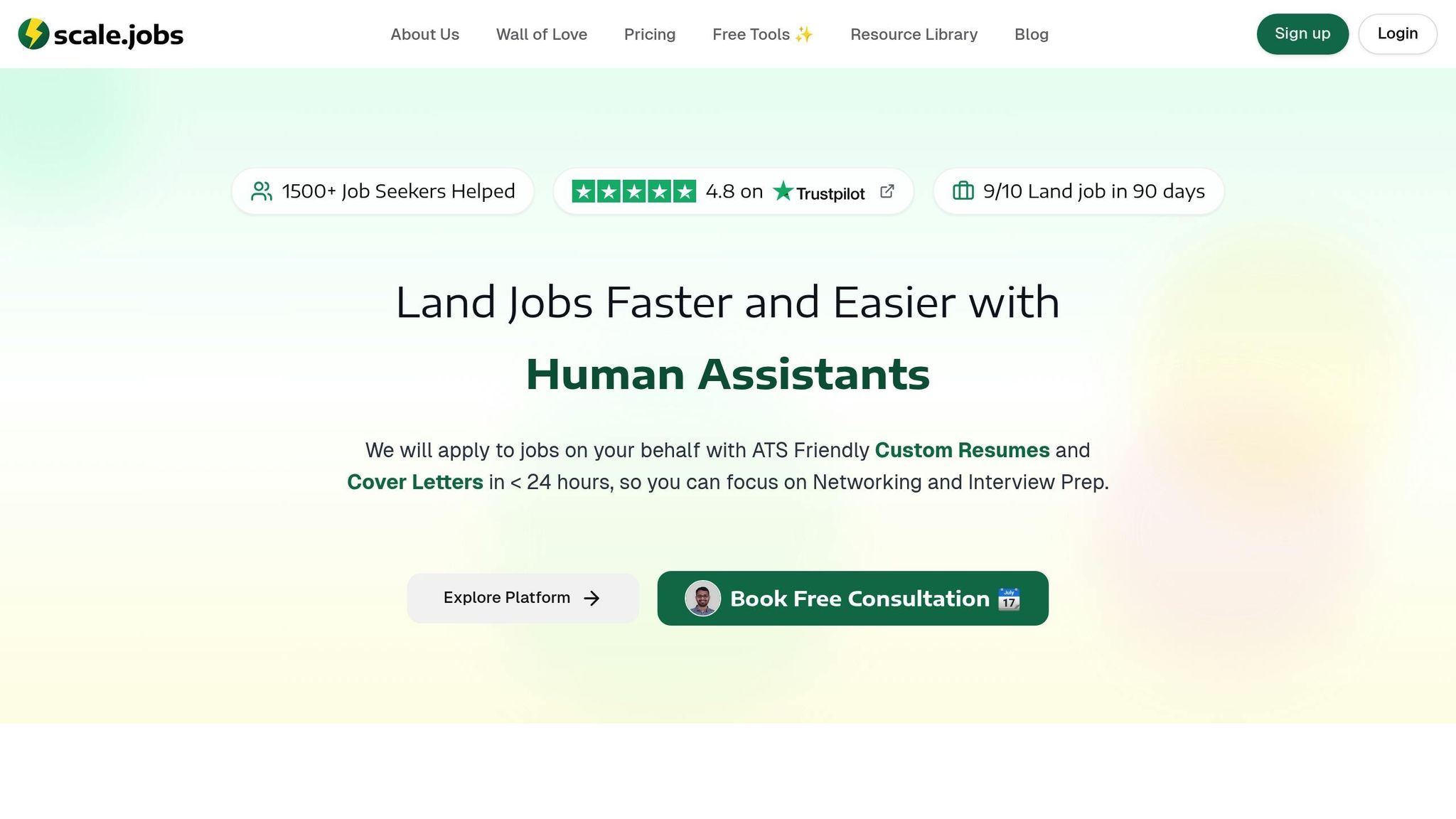
A solid foundation starts with well-organized, ATS-friendly application materials, and scale.jobs’ free tools are designed to help. These include an ATS-compliant resume builder, a job tracker, an AI-powered resume and cover letter generator, and access to expert human assistance - all aimed at simplifying your job search.
When paired with peer support, these tools can have an even greater impact. For example, use the ATS resume checker to fine-tune your resume for technical requirements, then share it with mentors from networks like TalentAlly's LGBTQ+ Career Network for feedback on tone and positioning. Beyond this, the scale.jobs job board aggregates over 2 million postings each month, expanding your access to opportunities far beyond what individual peer networks may provide.
AI Customization Features for Tailored Job Applications
With AI Assistant Pro, scale.jobs offers a way to streamline the job application process. For just $9 per month during its launch (regularly $19), the AI assistant automates key tasks like resume and cover letter customization. This leaves you with more time to focus on networking and honing your interview skills - areas where peer mentors often shine.
The AI assistant provides tailored resume creation, customized cover letters, and even interview question preparation, all aligned with specific job requirements. By combining these technical enhancements with the personal insights you gain from your peer network, you can ensure your applications are both polished and authentically representative of your strengths.
Human Assistant Services for Better Application Management
For job seekers who need more hands-on support - especially those dealing with complex challenges like visa requirements - scale.jobs’ Human Assistant services are a game-changer. These experts manage the entire application process, saving you over 20 hours each week. With a transparent flat-fee pricing model (ranging from $199 for 250 applications to $1,099 for the ultimate bundle), you avoid recurring subscription costs while gaining clarity on your expenses.
Human assistants provide real-time updates via WhatsApp and share proof-of-work screenshots, ensuring complete transparency. While your peer network offers emotional and strategic support, these assistants handle the administrative legwork, giving you more time to focus on networking and interview preparation. Plus, the unused-credit refund policy ensures you only pay for the services you actually use.
Here’s a quick comparison of how combining peer networks with scale.jobs’ tools can elevate your job search:
| Service Type | Peer Support Networks | scale.jobs Tools & Services | Combined Benefit |
|---|---|---|---|
| Resume Feedback | Qualitative, identity-focused | ATS optimization and technical compliance | A resume that’s both technically polished and culturally informed |
| Job Leads | Community referrals and insider tips | 2M+ monthly postings with broad access | High-quality leads paired with extensive options |
| Application Management | Moral support and accountability | Automated tracking and human assistance | Emotional support combined with operational efficiency |
| Interview Prep | Lived experience and personal insights | AI-driven question preparation | Real-world advice paired with technical preparation |
Conclusion: Building Your Support System for Career Success
Achieving success as an LGBTQ+ job seeker goes beyond crafting a standout resume. It requires a well-rounded support system that blends emotional backing from peers with practical tools to tackle the challenges of today’s job market.
Peer networks like Washington Peer Network, TalentAlly's LGBTQ+ Career Network, and TransWork play a vital role in this journey. These communities offer safe spaces to share workplace challenges, connect with mentors who understand your experiences, and link you with employers who genuinely value diversity. Considering that nearly half of LGBTQ+ workers in the U.S. (46%, according to the Human Rights Campaign) still feel the need to hide their identities at work, having a trusted network isn't just helpful - it’s essential for both personal and professional growth.
But community support alone doesn’t cover all the bases. In a digital-first job market, tools like scale.jobs step in to bridge the gap. With features like ATS-compliant resume builders, AI-driven customization, and human assistant services, this platform streamlines the application process. The free tier offers job tracking and resume optimization, while the AI Assistant Pro plan, priced at $9 per month (introductory offer), can save hours by automating application tailoring for specific roles.
By combining the insights gained from peer networks with the efficiency of digital tools, you can create a powerful job search strategy. Peer communities help you identify inclusive employers and understand their workplace cultures, while platforms like scale.jobs ensure your applications are technically polished and stand out in applicant tracking systems. This combination of emotional support and technical precision can save you significant time - up to 20 hours a week - while boosting your chances of success.
And there’s good news: companies with strong diversity and inclusion policies are 35% more likely to outperform their competitors financially, according to McKinsey’s 2020 research. This means that organizations actively seeking diverse talent are out there - you just need the right tools and connections to find them.
The goal isn’t just to land a job; it’s to find a workplace where you can truly thrive while being your authentic self. By leveraging peer networks and innovative platforms like scale.jobs, you can simplify your job search while staying true to your identity. Whether you’re just starting your career or seeking a role that better aligns with your values, this combination of support systems equips you to seize meaningful opportunities and grow professionally in an affirming environment.
FAQs
How can I find an LGBTQ+ peer support network that matches my career goals and personal identity?
Finding an LGBTQ+ peer support network that feels right for you means thinking about how inclusive it is, what resources it offers, and whether it aligns with both your career goals and personal identity. Seek out groups that provide mentorship, advocacy, and career-focused resources specifically designed for LGBTQ+ professionals.
Look for organizations that prioritize creating a welcoming space and offer tools tailored to your needs - like job boards, networking events, or skill-building workshops. Consider whether their programs, such as mentorship opportunities or advocacy efforts, match your goals and aspirations to ensure they’re a good fit for your path forward.
What challenges do LGBTQ+ job seekers face, and how do support networks help?
LGBTQ+ job seekers frequently face hurdles like workplace discrimination, biases during the hiring process, and concerns about being stigmatized. These challenges can take a toll on their confidence, career progression, and overall sense of well-being.
Support networks are crucial in tackling these issues. They offer safe spaces where individuals can connect with others who share similar experiences, exchange advice, and seek support. These networks often provide valuable resources, including mentorship programs, advocacy for inclusive workplace policies, and practical tools to assist with job searches. By creating a sense of community and empowerment, they help LGBTQ+ professionals navigate obstacles and build fulfilling careers.
Do LGBTQ+ peer support networks charge membership fees, and what benefits do paid memberships provide?
Some LGBTQ+ peer support networks require membership fees, while others are completely free to join. The costs can differ significantly - some groups suggest annual donations starting at $150, while others offer tiered options ranging from $400 to $2,500, depending on the level of support and benefits provided.
For those who opt for paid memberships, there are often perks like access to exclusive events, professional networking opportunities, and specialized resources such as mental health support or legal referrals. These fees also play a vital role in keeping the network running smoothly, helping to create a stronger, more supportive community for everyone involved.